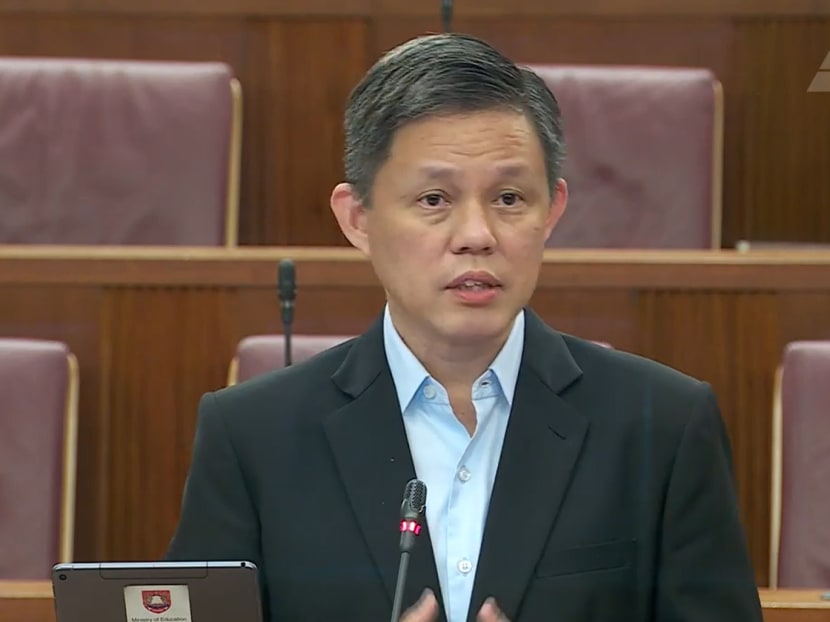S'poreans should share networks, opportunities with students from other schools, not just their alma maters: Chan Chun Sing
SINGAPORE — Singapore must never allow itself to denegerate into a society where “everyone thinks they deserve more relative to others”, said Education Minister Chan Chun Sing in Parliament on Tuesday (April 18).

Education Minister Chan Chun Sing speaking in Parliament on April 18, 2023.
- Education Minister Chan Chun Sing warned about Singapore degenerating into a society where everyone thinks they deserve more than others
- He talked about how Singapore’s version of meritocracy may be sustainable and resilient
- Mr Masagos Zulkifli, Minister for Social and Family Development, spoke about strengthening government policies to uplift lower-income families
- The Government will better collaborate with academics and institutes of higher learning to improve policies and social work practices, he said
- Other topics that came up during the second day of debate on President Halimah Yacob's address to Parliament included engaging young Singaporeans and whether to do away with the PSLE for students
SINGAPORE — Singaporeans should share their networks and opportunities not just with students of their alma mater but those in other schools as well, Education Minister Chan Chun Sing said, adding a special appeal to alumni from established schools.
Doing so will ensure that the wider community may progress and succeed like they did.
He was speaking in Parliament on Tuesday (April 18) in a speech that touched on ways to keep Singaporean meritocracy resilient and sustainable.
These included valuing people's diverse talents and creating more diverse education pathways, as he sounded a warning not to degenerate into a system where "everyone thinks they deserve more than others".
Mr Masagos Zulkifli, Minister for Social and Family Development, also spoke about strengthening government policies to uplift lower-income families, starting by giving "all children a good start in life".
This will be done by scaling up the KidStart programme nation-wide by 2026, and continuing to facilitate priority enrolment for children from lower-income families in Anchor Operator preschools and Ministry of Education Kindergartens.
KidStart is a nonprofit organisation aimed at helping children up to the age of six from low-income families so that they may have a good start in life.
On Tuesday, 12 MPs, two Nominated MPs, one Non-Constituency MP, and three political office-holders were in Parliament for slightly more than five hours debating for the second day President Halimah Yacob's address, which was delivered last week when Parliament reopened.
In addition to education and more support for families, some MPs also spoke about the aspirations of youth as well as the proposed through-train programme from Primary 1 to Secondary 4 that may be an option for students to bypass the Primary School Leaving Examination.
MEASURING SUCCESS
Mr Chan's speech called on everyone in society to contribute their time and talent, and specifically on the alumni of more established schools to "come forward, to join hands with us, to contribute to the wider community of schools, so that we can all progress together, faster and better".
"Some may ask, ‘What can I contribute if I am not as successful? If I did not come from a school with a more illustrious history? If I do not earn a big salary, wear expensive clothes, live in a big house or drive a fancy car?"
His answer to these questions was that those material achievements are not the only yardsticks of success and they should not define one's ability to contribute.
They should also not determine the respect and dignity that one deserves, he said.
"Instead, we must define success by how much we contribute to others and the greater good, and not just how much we achieve for ourselves."
A major challenge Singapore that faces is avoiding a system where everyone believes they deserve more than others, he added.
"I fear a day when we constantly feel a sense of relative deprivation from seeing someone else getting more help than us, instead of feeling a sense of gratitude at being helped, or feeling a sense of satisfaction at being able to help someone else."
Singapore's measure of success as a society should not be based on how many people are helped because they are unable to keep up, but how few people need to be helped because they are enabled to thrive.
Mr Chan also outlined the pitfalls of meritocracy and how best to plug such gaps.
The dangers of meritocracy, he said, include a "static and narrow" metric for talent, rewarding success at fixed, pre-determined points in life and time, and the misplaced belief that one's success is attributed entirely to talent and hard work.
Various countries have tried to fix the process in different ways with some countries trying out affirmative action for less privileged groups, he noted.
"While meritocracy has generally worked well for Singapore so far and we have largely avoided the need for such measures, we also acknowledge that our system is not perfect."
To plug such gaps and achieve a resilient and sustainable meritocracy, the Government will have to value people's diverse abilities, continue to create a more diverse education pathway and respect a variety of professions, among other measures.
A “sustainable and resilient meritocracy” is one where the largest number of people are enabled to achieve and contribute.
In turn, this group of people are then able to take care of the fewest who are unable to achieve as much.
“All of us must recognise that our individual success is never just due to our own abilities and hard work,” Mr Chan said.
“So even as we celebrate and enjoy the fruits of our own labour, we must not forget to give back to society and others around us.”
SUPPORT FOR FAMILIES
In a separate speech on Tuesday, Mr Masagos said in Parliament that the Government will "reinforce and support" the personal agency of families who wish to improve their circumstances.
Mr Masagos, who is also the Second Minister for Health, said that many families want to secure a better future for themselves and are actively taking steps to do so.
Highlighting some examples from the Forward Singapore public consultation exercise, he said that some participants have suggested that Singapore find ways to encourage families who take positive steps such as securing stable employment and ensuring that their children attend preschool.
However, the participants said that this has to be done in a manner that does not erode the sense of self-reliance and personal agency of such families.
"When such families put in the effort, we know they are on the road to making progress in their lives. And as part of our social compact, it is good and right that we recognise such efforts," Mr Masagos said.
To that end, he said without going into detail, the Government is studying how to do this in a bigger way, under the Community Link (ComLink) initiative, which provides targeted support for families with children living in rental flats.
Mr Masagos also said that in Singapore's efforts to uplift communities, the country needs to tap “the best minds and translate the best research into practice to make a tangible impact".
Thus, the Government will be strengthening its collaboration with academics and institutes of higher learning to improve policies, social work practices, and the delivery of services to meet the country’s evolving social needs.
ENGAGING THE YOUTH
Ms Sylvia Lim, Worker's Party (WP) MP for Aljunied Group Representation Constituency (GRC), suggested engaging young people in matters beyond "woke" topics such as climate change or discrimination.
Referring to a news report by TODAY, Ms Lim said that the views of young people have changed and that the Government should enable young people to have direct participation in governance and policy formulation.
"Some young people expressed cynicism about existing forms of engagement. Several interviewees (in the report) argued that the engagement had to go beyond just talking, but should enable young people to have direct participation in governance and policy formulation.
"One person doubted that the views of young people would be accepted unless those views aligned with the Government’s own ideals. Whatever the views expressed, there was common ground that any engagement should foster in young people a sense of responsibility."
She also said: "We must be careful not to pigeonhole young people's issues into a handful of areas and only seek to engage them on those. That would be a big turnoff and a disservice to our young."
The empowerment of young Singaporeans need not and should not be a top-down affair, Ms Lim added.
Instead, young citizens can and should “seize the day” and organise themselves around the causes they care about and are supporting.
She suggested making a change to the voting age from 21 to 18, to give younger cohorts a direct say in national elections.
This was a proposal she had raised in Parliament 16 years ago and most recently at the debates for various government ministries’ budgets this year.
The Government's response to her suggestion had always been a resounding “no”, but Ms Lim believes that it is important to foster a dynamic environment where "ageist stereotypes, prejudice and discrimination" are a thing of the past.
THROUGH-TRAIN PROGRAMME TO BYPASS PSLE
A suggestion on Monday by another WP MP, Mr Gerald Giam from Aljunied GRC, for a through-train programme for students to go straight from Primary 1 to Secondary 4, was also the topic of a debate on Tuesday.
Pioneer Single Member Constituency MP Patrick Tay, who is chairman of the Education Government Parliamentary Committee, said that such a scheme was not a new idea and had been proposed almost a decade ago and on different occasions by Jalan Besar GRC MP Denise Phua.
However, the Ministry of Education already explained earlier this year after the Budget that there were constraints to this idea with challenges to implementation that must be carefully considered, said Mr Tay.
In response, Mr Giam said that "in the interest of arriving at the best policies for Singapore regardless of who raised it first", he would like to ask if Mr Tay and Ms Phua think the through-train idea would be a good option for parents who want their children to bypass the PSLE.
Mr Tay reiterated that there are constraints in implementing such a through-train as it covers a whole continuum from primary to secondary school.
Teachers and staff members in schools are already facing "exacting" requirements and demands on their time and resources, and introducing such a scheme will mean stretching them and the “entire education ecosystem”.
Ms Phua acknowledged that a through-train pilot programme is still a potential good pathway in doing away with the PSLE but she agreed that it may be difficult to execute.
She proposed that the debate should not be about whether to have or not to have such a programme, but it should be brought to the "next level" in the Forward Singapore conversations to determine what it would take to create a pathway like this.
CORRECTION: An earlier version of this article stated that Mr Patrick Tay is MP for West Coast GRC. This is incorrect. He is MP for Pioneer. We are sorry for the error.












